| |||||
| Centuries: | |||||
|---|---|---|---|---|---|
| Decades: | |||||
| See also: | Other events of 2007 Years in North Korea Timeline of Korean history 2007 in South Korea | ||||
Events from the year 2007 in North Korea.
| |||||
| Centuries: | |||||
|---|---|---|---|---|---|
| Decades: | |||||
| See also: | Other events of 2007 Years in North Korea Timeline of Korean history 2007 in South Korea | ||||
Events from the year 2007 in North Korea.

Kim Jong Il was a North Korean politician who was the second supreme leader of North Korea. He led North Korea from the death of his father Kim Il Sung in 1994 until his death in 2011, when he was succeeded by his son, Kim Jong Un. Afterwards, Kim Jong Il was declared Eternal General Secretary of the WPK.
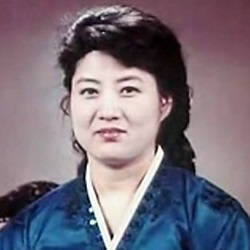
Ko Yong Hui, also spelled Ko Young-hee, was the mistress of North Korean supreme leader Kim Jong Il and the mother of his successor, Kim Jong Un. Within North Korea, she is only referred to by titles, such as "The Respected Mother who is the Most Faithful and Loyal 'Subject' to the Dear Leader Comrade Supreme Commander", "The Mother of Pyongyang", and "The Mother of Great Songun Korea".

In the North Korean government, the Cabinet is the administrative and executive body. The North Korean government consists of three branches: administrative, legislative, and judicial. However, they are not independent of each other, but all branches are under the exclusive political leadership of the Workers' Party of Korea (WPK).

Kim Jong Un is a North Korean politician who has been supreme leader of North Korea since 2011 and the leader of the Workers' Party of Korea (WPK) since 2012. He is the third son of Kim Jong Il, who was the second supreme leader of North Korea, and a grandson of Kim Il Sung, the founder and first supreme leader of the country.

Jo Myong-rok was a North Korean military officer who held the military rank Chasu. In 1998, he was appointed first vice-chairman of the National Defence Commission of North Korea, Director of the Korean People's Army General Political Bureau. Previously, he was the commander of the air defence forces.

Parliamentary elections were held in North Korea on 8 March 2009 to elect the members of the 12th Supreme People's Assembly. They were originally scheduled to be held in August 2008 but were postponed for unknown reasons. Observers of North Korea speculated that it was in relation to Kim Jong-il's ill health.

The death of Kim Jong Il was reported by North Korean state television news on 19 December 2011. The presenter Ri Chun-hee announced that he had died on 17 December at 8:30 am of a massive heart attack while travelling by train to an area outside Pyongyang. Reportedly, he had received medical treatment for cardiac and cerebrovascular diseases, and during the trip, Kim was said to have had an "advanced acute myocardial infarction, complicated with a serious heart shock". However, it was reported in December 2012 by South Korean media that the heart attack had instead occurred in a fit of rage over construction faults in a crucial power plant project at Huichon in Chagang Province.
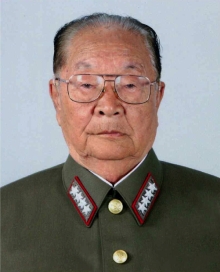
Jon Pyong-ho was a North Korean officer and politician who served as the Chief Secretary of the Korean Workers Party (KWP) Committee of the North Korean Cabinet, and director of the DPRK Cabinet Political Bureau before his retirement in 2010. Jon was described as the 'Chief architect of North Korea's nuclear programme'. Jon was a general of the Korean People's Army and a close adviser to the late Kim Jong-il.

Kim Il Sung died of a sudden heart attack on the early morning of 8 July 1994 at age 82. North Korea's government did not report the death for more than 34 hours after it occurred. An official mourning period was declared from 8–17 July, during which the national flag was flown at half mast throughout the country, and all forms of amusement and dancing were prohibited.

Choe Ryong-hae is a North Korean politician and military officer who currently serves as Chairman of the Standing Committee of the Supreme People's Assembly and First Vice President of the State Affairs Commission, holding both positions since April 2019. Due to holding the first office, he was considered the head of state of North Korea before the country's constitution was amended to transfer this position to the President of the State Affairs Commission, Kim Jong Un. He is also a member of the Presidium of the Politburo and Vice Chairman of the Workers' Party of Korea (WPK). He also served as Supreme Leader Kim Jong Un's military second-in-command, currently being third top-ranking official in North Korea after Kim Jong Un and premier Kim Tok-hun.

The Kim family, also known as the Kim dynasty or the Mount Paektu bloodline in the ideological discourse of the Workers' Party of Korea (WPK), is a three-generation lineage of North Korean leadership, descending from the country's founder and first leader, Kim Il Sung. The patriarch came to rule the north in 1948, after the end of Japanese rule split the region in 1945. He began the Korean War in 1950, in a failed attempt to reunify the Korean Peninsula. In the 1980s, Kim Il Sung developed a cult of personality closely tied to the North Korean state philosophy of Juche. Following his death in 1994, Kim Il Sung's role as supreme leader was passed on to his son Kim Jong Il, and then to his grandson Kim Jong Un. All three men have served as leaders of the WPK and have exercised absolute control over North Korea since the state's establishment in 1948.
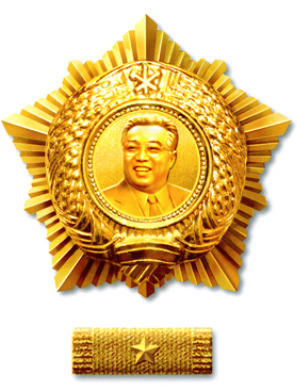
The Order of Kim Il Sung (Korean: 김일성훈장) is the highest order of North Korea, along with the Order of Kim Jong Il, and only second to one honorary title, the Hero of Labour.

The Order of Kim Jong Il is a North Korean order named after Kim Jong Il, the former leader of North Korea. It is the highest order of North Korea, along with the Order of Kim Il-Sung, and only second to one honorary title, the Hero of Labour.
The Kim Il Sung Prize (Korean: 김일성상) is an award given by the Government of North Korea to persons in various fields who demonstrate exemplary service to the values of Juche idea. Past winners include the Korean composer Kim Won-gyun, judoka Kye Sun-hui, and the Arirang Festival.

The 11th Supreme People's Assembly of North Korea was in session from 2003 until 2009. It consisted of 687 deputies, and held six sessions.
The 2013 Hwaebul Cup was the inaugural edition of the Hwaebul Cup football competition celebrating North Korea's Youth Day. The competition was held between 15 and 28 August 2013, with all matches played at the Kim Il-sung Stadium in P'yŏngyang. The competition was arranged in two phases, a group stage followed by a single-elimination play-off semi-finals, and a single-game final.
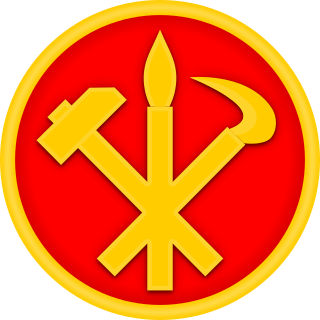
The Propaganda and Agitation Department, officially translated as the Publicity and Information Department, is a department of the Central Committee of the Workers' Party of Korea (WPK) tasked with coordinating the creation and dissemination of propaganda in North Korea. It is the highest propaganda organization in the country.

Parliamentary elections were held in North Korea on 10 March 2019 to elect the members of the 14th Supreme People's Assembly. The elections were announced on 6 January 2019. With only one candidate on the ballot in each constituency, outside observers described it as a show election. 687 candidates for the DPRK deputies to the SPA were elected. Kim Jong Un did not stand for election, marking the first time that a North Korean leader did not participate as a candidate.

Hwang Sun-hui was a North Korean politician who served in several high-ranking positions in the Workers' Party of Korea (WPK), including in the Supreme People's Assembly and the Central Committee of the WPK. She was affiliated with the Korean Revolution Museum from 1965, and was its director from 1990.
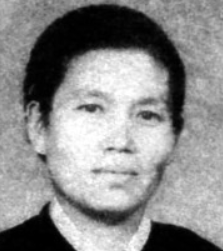
Ri Yong-suk was a North Korean politician and revolutionary. A veteran of the anti-Japanese struggle, Ri had close relations with all three generations of the Kim dynasty. During WWII, she was with Kim Il Sung in the Soviet 88th Separate Rifle Brigade. During the Korean War, she took care of Kim Jong Il, eldest son and future heir of Kim Il Sung. Under Kim Jong Un, she was portrayed as a link between the original guerrilla generation and the current leadership. Ri was elected to the Supreme People's Assembly in 1998 and 2003.